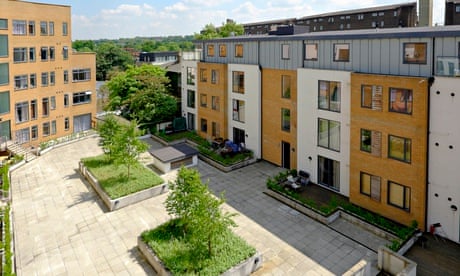Thanks, Guardian, for helping solve the riddle of why more houses are not built in spite of large numbers of people in housing need and houses fetching record prices (Tesco unlocks its landbank to build 4,000 homes, 19 July). (pPausing to query how it is that Tesco are so sure to get permission to build houses on land earmarked for retail development and whether the houses will actually be built and when, we refer to the Barker Review of Housing Supply interim report in 2003 where just seven named corporate housebuilders held landbanks of land surplus to their present or imminent requirement equivalent to 732,000 (unbuilt) new houses. Compare the total new house completions achieved in England in 2013 of 109,370.
Just one named corporate housebuilder, Wilson Bowden, whose annual output in 2002 was 4,164 houses, held a landbank sufficient to supply more than the whole national new house build, or 33 years' supply of their own requirements at their then annual rate of build. Wimpey held 16 years' supply and Persimmon 19 years' supply. Barker explained landbanks: "housebuilders are primarily rewarded for obtaining valuable land rather than responding to consumer needs", which, translated from Whitehallese, means that they make greater profit on the rise in value of undeveloped land than they do from building houses on it.
But it is not only housebuilders who block development by holding landbanks. Barker reported that Legal & General held a landbank equivalent to 79,000 housing units. Although it was unpermissioned land, Barker explained that a housebuilder might hope to have it included in a local development plan. Near Dorchester, in 1994 the Duchy of Cornwall was granted permission to build some 8,000 new houses on land that was formerly Poundbury farm and Middle farm. Twenty years later, many of the houses have yet to be built.
Now, added to housebuilders who won't build and insurance companies (pension funds?) who don't build, we have giant corporate retailers and traditional landowners – and who else? – withholding the only land earmarked for building houses. It is ironic that self-builders reported to the Office of Fair Trading Homebuilding (sic) Survey 2008 that finding land was their greatest perceived difficulty. The British housing market is broken. It's not a game but real-life monopoly in which the landbankers always win.
James Armstrong
(Contributor to the Barker review and to the OFT Homebuilding Survey), Dorchester
